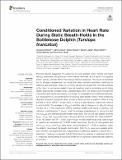Conditioned variation in heart rate during static breath-holds in the bottlenose dolphin (Tursiops truncatus)
Abstract
Previous reports suggested the existence of direct somatic motor control over heart rate (fH) responses during diving in some marine mammals, as the result of a cognitive and/or learning process rather than being a reflexive response. This would be beneficial for O2 storage management, but would also allow ventilation-perfusion matching for selective gas exchange, where O2 and CO2 can be exchanged with minimal exchange of N2. Such a mechanism explains how air breathing marine vertebrates avoid diving related gas bubble formation during repeated dives, and how stress could interrupt this mechanism and cause excessive N2 exchange. To investigate the conditioned response, we measured the fH-response before and during static breath-holds in three bottlenose dolphins (Tursiops truncatus) when shown a visual symbol to perform either a long (LONG) or short (SHORT) breath-hold, or during a spontaneous breath-hold without a symbol (NS). The average fH (ifHstart), and the rate of change in fH (difH/dt) during the first 20 s of the breath-hold differed between breath-hold types. In addition, the minimum instantaneous fH (ifHmin), and the average instantaneous fH during the last 10 s (ifHend) also differed between breath-hold types. The difH/dt was greater, and the ifHstart, ifHmin, and ifHend were lower during a LONG as compared with either a SHORT, or an NS breath-hold (P < 0.05). Even though the NS breath-hold dives were longer in duration as compared with SHORT breath-hold dives, the difH/dt was greater and the ifHstart, ifHmin, and ifHend were lower during the latter (P < 0.05). In addition, when the dolphin determined the breath-hold duration (NS), the fH was more variable within and between individuals and trials, suggesting a conditioned capacity to adjust the fH-response. These results suggest that dolphins have the capacity to selectively alter the fH-response during diving and provide evidence for significant cardiovascular plasticity in dolphins.
Citation
Fahlman , A , Cozzi , B , Manley , M , Jabas , S , Malik , M , Blawas , A & Janik , V M 2020 , ' Conditioned variation in heart rate during static breath-holds in the bottlenose dolphin ( Tursiops truncatus ) ' , Frontiers in Physiology , vol. 11 , 604018 . https://doi.org/10.3389/fphys.2020.604018
Publication
Frontiers in Physiology
Status
Peer reviewed
ISSN
1664-042XType
Journal article
Description
Funding for this project was provided by the Office of Naval Research to AF (ONR Award # N00014-16-1-3088).Collections
Items in the St Andrews Research Repository are protected by copyright, with all rights reserved, unless otherwise indicated.

